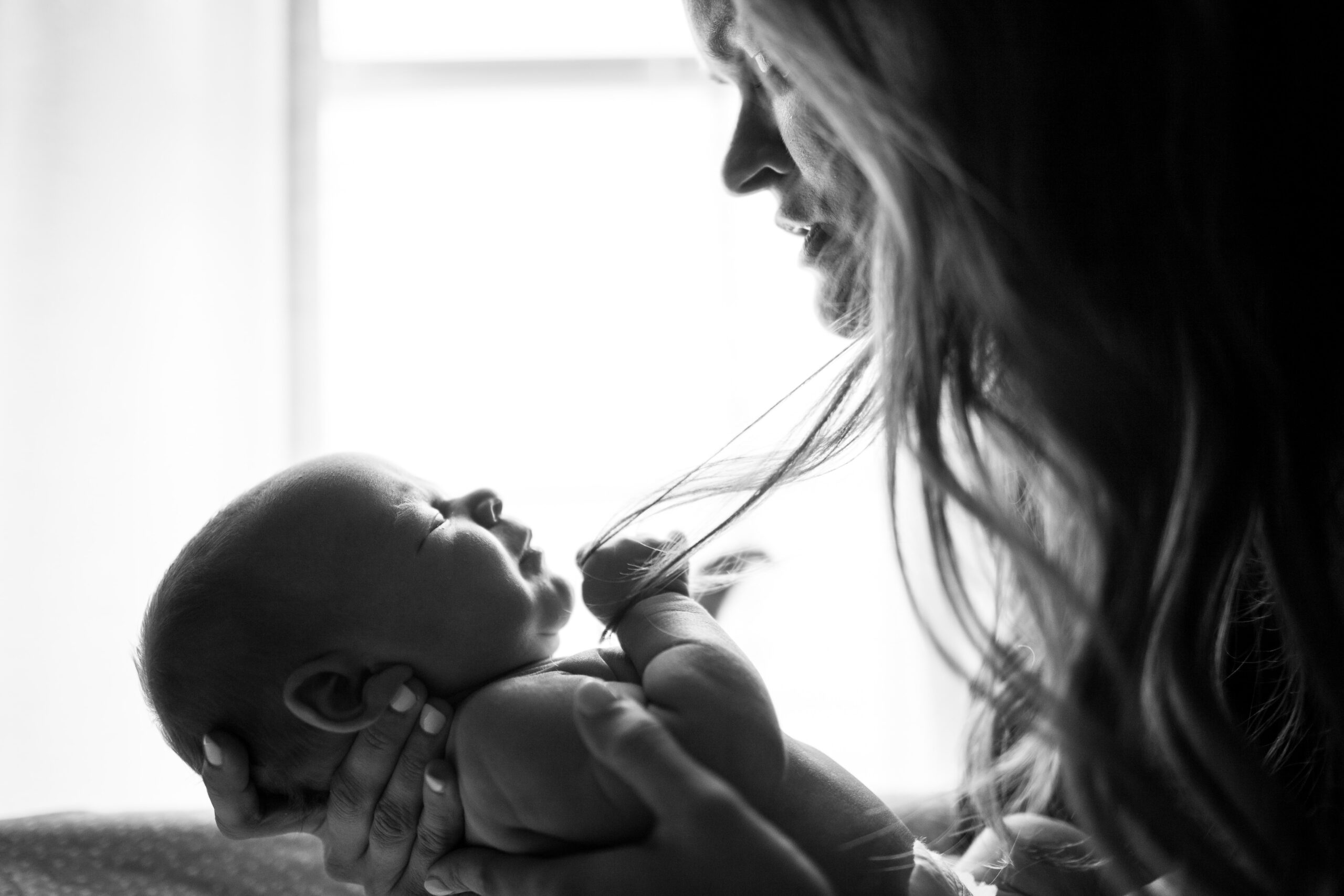How to Deal with Postpartum Depression
Postpartum depression (PPD) is a type of depression that occurs in people who just gave birth, typically within the first few weeks to months after childbirth. It can result in depressive, anxious, and worn-out sensations, making it challenging to do daily tasks like eating, sleeping, and bonding with your child. To some extent, postpartum depression can feel like an extension of the baby blues, but it lasts longer and can be more severe. If left untreated, it can have fatal consequences. That is why learning how to deal with postpartum depression is vital!
Postpartum Depression and the Baby Blues
According to the APA, it is common for people to have “baby blues” after having a baby; this is a time after birth when the parent can feel “stressed, sad, anxious, lonely, tired or weepy.” The baby blues can last up to 2 weeks. However, postpartum depression (PPD) lasts longer and doesn’t go away on its own.
Being a new parent already comes with its own stressors. New parents seemingly worry about everything regarding their new baby.
Common Concerns of New Parents
- The baby’s sleeping schedule
- Whether the baby is eating enough, establishing a proper feeding schedule, whether the baby is latching or not, etc.
- The health and safety of the baby
- Parents often worry about Sudden infant death syndrome (SIDS), which according to the Mayo Clinic, is “the unexplained death, usually during sleep, of a seemingly healthy baby less than a year old”
- If the baby is reaching developmental milestones and progressing healthily
Postpartum Depression in Fathers and LGBTQ Parents
Postpartum depression is most known for affecting new mothers, but transgender or gender non-binary (TGNB) can face “many of the same emotional changes that cisgender women experience.” In fact, postpartum depression in fathers is not uncommon either. We must take mental health concerns seriously, especially regarding the well-being of any new parent.
Symptoms of Postpartum Depression
On top of the stress of being a new parent, people who just gave birth might also be dealing with PPD. Postpartum depression can be very debilitating and difficult for the person experiencing symptoms.
Postpartum Depression Symptoms
- Persistent depressive, anxious, or despairing emotions
- Loss of enjoyment or interest in once-enjoyable activities
- Feelings of guilt or worthlessness
- Fatigue or a decrease in energy
- Alterations in eating or sleeping habits
- Having trouble focusing or making judgments
- Anger, irritability, or restlessness
- Withdrawal from friends and relatives
- Excessive sobbing or empty feeling
- Thinking about self-harm or injury to your child
It is also worth noting that postpartum anxiety and depression can go hand in hand. Specifically, postpartum anxiety is characterized by excessive worrying, fear, and nervousness that can interfere with daily life.
Symptoms of Postpartum Anxiety
- Constant worry or fear about the baby’s health, safety, or well-being.
- Racing thoughts, persistent, intrusive, or unwanted thoughts that are difficult to control.
- Panic attacks with symptoms of heart palpitations, sweating, and shortness of breath.
- Insomnia and other physical symptoms of headaches, dizziness, or gastrointestinal issues
- Avoiding certain places or situations
- Hyper-vigilance, or being constantly on high alert for potential threats or dangers.
- Irritability and having a short fuse.
- Difficulty concentrating
- Obsessive-compulsive behaviors such as checking and rechecking the baby’s safety, cleanliness, or health.
Stigma Around Postpartum Depression and Anxiety
As discussed in our past article about mental health stigma, The National Alliance on Mental Illness (NAMI) reports that most people who have mental illness have at some point been blamed for their symptoms – this is due to mental health stigma. According to the APA Dictionary, a stigma is “a negative social attitude attached to a characteristic of an individual that may be regarded as a mental, physical, or social deficiency.”
Stigmas cause people to judge/look down on others, resulting in prejudice, discrimination, and an incorrect perception of what individuals are genuinely dealing with.
Parents, especially mothers, deal with many stigmas regarding the way they raise their children. “Mom shaming” is a common practice in our society. Moms are shamed and judged for their parenting decisions left and right. Moms are judged for being too lenient, too strict, for working, for being stay-at-home moms… and the list goes on and on.
Stigma and judgments are dangerous because they prevent people from getting the mental health help they need. Moms facing PPD may be too afraid to speak up and get help because of the stigma around mental health and motherhood in our society.
More knowledge and awareness about mental health leads to dismantling prejudices or stigmas attached to mental health conditions; this will help people who are silently suffering get the help they need.
How to Deal with Postpartum Depression (PPD)
If you are reading this article, you are probably wondering how to deal with postpartum depression. Mind Connections wants anyone struggling postpartum to know they are not alone and help is out there. Here are some ways to cope with Postpartum Depression (PPD):
Postpartum Depression and Social Support
Parenting is hard work, especially when feeling symptoms of PPD. You deserve to receive support for help with the baby, but also for your mental health and well-being. Know that you don’t have to go through postpartum alone!
We encourage you to tell your loved ones and close friends how you feel. Join a support group of other parents who are going through similar experiences. Social support can be life-saving and help people embrace the idea that they are not alone.
Consider Receiving Professional Help
If you are struggling with PPD, talk with a healthcare professional or therapist who helps people with PPD, anxiety, or depression. Professionals can help you receive the treatment you need and also suggest medication that can improve your PPD symptoms.
Here are some resources from Postpartum Support International for how to deal with postpartum depression after birth: https://www.postpartum.net/get-help/help-for-moms/
Self-Care for Postpartum Depression
Be sure, to be honest with your emotions and prioritize your needs. Consider asking family members or friends to help care for your baby so that you can get some rest. Try your best to ensure you are eating, taking breaks, and doing what you need to cope with the stress.
You can also try mindfulness practices and calming activities. Being a new parent can be very stressful. Mindfulness, guided meditations, and breathing exercises can all help you de-stress and control your anxieties more.
Know That Your Feelings Matter
Don’t let anyone tell you that your feelings or emotions don’t matter. Many women can have their feelings disregarded or pushed aside, especially in the medical sense; past studies show that postpartum is overlooked and undertreated. If you need help, don’t hesitate to speak up. In instances where a doctor isn’t taking you seriously or giving you the help you need, look for a second opinion and advocate for yourself. Lean on support and have them help you during this time.
How to Help Someone With Postpartum Depression and Anxiety
If you are reading this article, you are probably wondering how to deal with postpartum depression after birth, or you may know someone who is going through symptoms and want to help them. Reach out to anyone who might be struggling with PPD, and help them by:
Offering Any Assistance They May Need
Reach out to the person with PPD and offer to help them in any way you can. If they seem like they are struggling, you can offer to:
- Babysit for them or help with childcare while they get some rest, get out of the house, or practice self-care
- Help with household tasks like laundry, cleaning, cooking, etc.
- Cook dinner for them or bring over some of your food to offer
- Check in with them and ask if they need anything throughout the week
Be there to Talk and Listen
As mentioned before, social support can be crucial to someone’s overall well-being. Just being there for someone when they are going through a hard time can make someone feel supported and less alone. Text, call, or stop by to see how this person is doing. Offer to listen to them vent, do things with them to help them de-stress/get their mind off their struggles, make them laugh, show them compassion, etc. All of these things can help the person feel your support!
Assist Them in Finding Care
Help the person you know with PPD find support, whether that’d be doctors, therapists, or support groups. Help them advocate for their needs and elevate their voice and concerns. Encourage them to seek professional help and let them know you support them if they decide to go to therapy or get medical attention.
Speak Out If You Can Relate:
Many people go through postpartum depression but may be too afraid to speak out and get help. Know that your voice is powerful and that sharing your experience and how you coped with this time in your life might help others feel supported and able to speak up too.
Reminders for Anyone Struggling After Giving Birth
- It is not selfish to take of yourself and your needs
- Your mental health and well-being are ALWAYS important
- You deserve support at this time of your life
- There are so many people out there experiencing the same things you are – you are never alone!
- The voice you have matters especially when it comes to your health
- You will get through this and this time in your life will too pass
Why Raising Awareness About Postpartum Depression Is So Important:
TW: Mentions of Death and Suicide
Raising awareness about postpartum depression is essential because around 1 in 7 women can develop this condition. This condition is, as stated before, often disregarded and undertreated. We need to help parents out there who experience the effects of PPD and allow them to feel supported.
The recent tragedy of the Lindsay Clancy case inspired this article. Lindsay Clancy was said to have struggled with postpartum depression and potentially postpartum psychosis. Many people believe that Clancy was given improper medical attention, leading to the alleged killing of her children and her attempted suicide. Friends and loved ones of Clancy said she was a devoted and loving mother who was tragically affected by her postpartum conditions.
The tragedy that happened to Lindsay Clancy and her children should not be in vain, and this case shows how important it is to spread awareness about postpartum depression. If you or a loved one is struggling postpartum, please seek support.
Our team at Mind Connections can help people with symptoms of depression, anxiety, and more. Call to find out how therapy can learn how to deal with postpartum depression after birth!
Content Creator, Victoria Gallo; Reviewed by Dr. June Cao








Thank you for writing something about postpartum depression. It’s so common but not many people discuss this